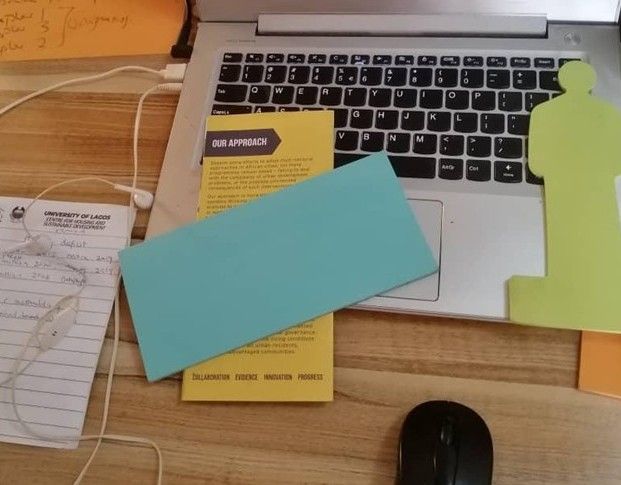PhD Student Joy Oyiza Obadoba reflecting on Summer School 2025
Centre for Housing and Sustainable Development, University of Lagos
CRAFTING AN INCLUSIVE FUTURE WITH THE POWER OF RESEARCH ANALYSIS TOOL
Consider Doing a PhD
Pursuing a PhD is a significant academic milestone that is often shaped by choices in location, resources, and academic focus. My journey began with the decision to study sustainable urbanisation, a field that addresses the pressing need for equitable, efficient, functional and environmentally responsible cities. At first, I considered undertaking the research in Hong Kong university because of access to a well-developed urban landscape, extensive academic resources, funding and a global perspective on sustainability. However, I later had the opportunity to conducting the same research in Nigerian through the Wits-TUB-UniLag Urban Lab, a trilateral programme between Technical University of Berlin, University of Witwatersrand and the University of Lagos. This brought different dimensions to my academic experience.

Photo of my study worktable at the University of Lagos. Source: Author
Inclusive Urban Futures Research
As cities evolve, the theme of an inclusive urban future is fundamentally relevant, demanding scholarly voices to shape policies and perspectives. African cities are globally recognised as fast growing cities,presenting real-world challenges of urbanization, including infrastructural gaps, environmental concerns, and socioeconomic disparities. Therefore, a need to ensure that research findings contribute meaningfully to academia and society. Doing my PhD at the University of Lagos allowed me access to direct engagement with these issues, offering insights into sustainable urbanisation and planning from lived reality perspectives.
Regardless of location, a crucial aspect of doctoral research remains the ability to document and analyse findings effectively. My study, which focuses on low-income housing, observed that researchers often utilise different approaches, either quantitative, qualitative or a combination of both, also known as a mixed-method approach, depending on the depth of study, research question and the research interest. Research tools such as Zotero for referencing and NVivo, SPSS, ATLAS. Ti for data analysis and Tableau, QGIS, and Space Syntax for data visualization facilitate the research process, ensuring accuracy, organization, and efficiency in academic writing.
Tools for Research Writing
- Zotero for Referencing: One of the biggest challenges in academic research is organizing sources and citing them accurately. Zotero simplifies this process by ensuring accuracy, reducing errors, and saving time during the writing phase in various styles (APA, Harvard, etc.).
- ATLAS.ti for Data Analysis: Research methods that employ a mixed-method approach involving qualitative and quantitative data must be systematically analysed. ATLAS. Ti, NVivo enhances this process by:coding and categorizing qualitative data effectively, ; integrating various data sources to produce rich insights,onducting thematic analysis to identify key patterns.
- QGIS (Geographic Information System): QGIS is an open-source GIS software that is essential in sustainable urbanisation research for inclusive city planning, as it helps assess land use, transportation networks, and environmental impact through interactive maps. QGIS software enables researchers to visualise, analyse, and interpret geospatial data. It is widely used for: spatial mapping, geospatial analysis and data integration.
- Space Syntax: Space syntax examines how spatial configurations influence human movement and social interactions. It provides insights into walkability, neighbourhood connectivity, and urban inclusivity, making it a valuable tool in sustainable city planning.
QGIS, space syntax, and mapping data collectively improve urban research, offering powerful spatial analysis capabilities. These tools enable researchers to interpret geographic trends, assess urban sustainability, and optimize city planning strategies
- SPSS: A statistical software designed for social science research, SPSS is widely used for survey analysis, hypothesis testing, and predictive analytics.
- Power BI and Tableau allow users to create interactive dashboards and reports, making insights more accessible for decision-making.
- Stata: Designed for econometrics and advanced statistical modelling for its strong capabilities in regression analysis and panel data handling
- Excel: A versatile spreadsheet tool used for data management, basic statistical analysis, and visualization. Excel is essential for organizing datasets, performing calculations, and generating charts for reporting.
In the context of a PhD focusing on sustainable urbanization for an inclusive urban future, incorporating these analytical methods allows for data-driven decision-making, fostering inclusive and efficient urban environments. By using assisted tools for referencing and analysis, students avoid manual bottlenecks and ensure a robust data analysis that is replicable, meaningful.
Building an Inclusive Urban Future
As cities in Nigeria continue to expand, the need for inclusive urban spaces has never been greater. Through painstaking research, writing and cutting-edge research tools, PhD studies contribute to a future where no urban dweller is left behind. My study believes that a well-written PhD research study can shape conversations on urban planning and inclusivity, influencing decisions and shaping policy. Leveraging research tools enhances the credibility and efficiency of writing a thesis, enabling focus on what truly matters, while generating impactful insights that drive change.


